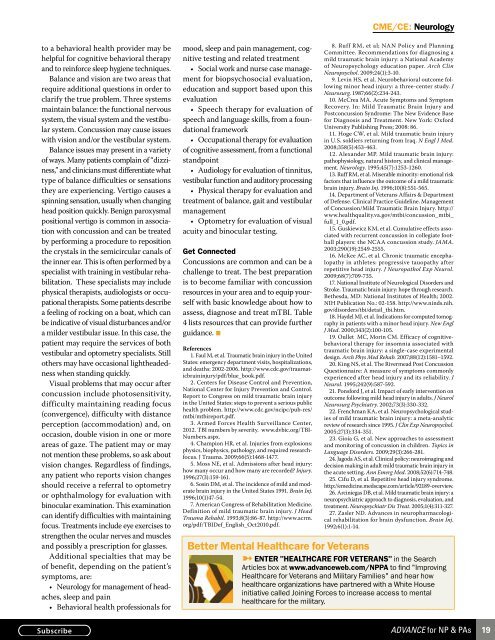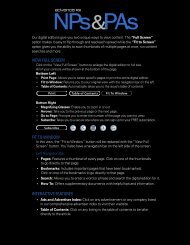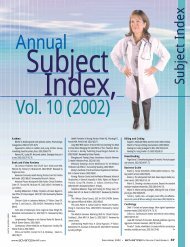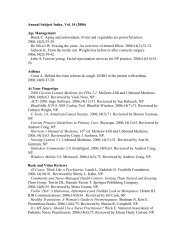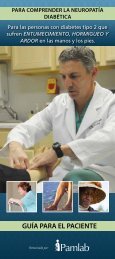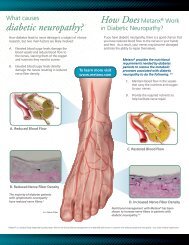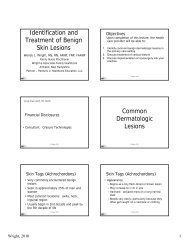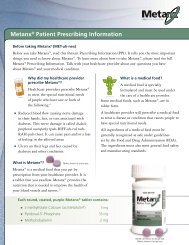View Full Screen - ADVANCE for NPs & PAs
View Full Screen - ADVANCE for NPs & PAs
View Full Screen - ADVANCE for NPs & PAs
Create successful ePaper yourself
Turn your PDF publications into a flip-book with our unique Google optimized e-Paper software.
CME/CE: Neurology<br />
to a behavioral health provider may be<br />
helpful <strong>for</strong> cognitive behavioral therapy<br />
and to rein<strong>for</strong>ce sleep hygiene techniques.<br />
Balance and vision are two areas that<br />
require additional questions in order to<br />
clarify the true problem. Three systems<br />
maintain balance: the functional nervous<br />
system, the visual system and the vestibular<br />
system. Concussion may cause issues<br />
with vision and/or the vestibular system.<br />
Balance issues may present in a variety<br />
of ways. Many patients complain of “dizziness,”<br />
and clinicians must differentiate what<br />
type of balance difficulties or sensations<br />
they are experiencing. Vertigo causes a<br />
spinning sensation, usually when changing<br />
head position quickly. Benign paroxysmal<br />
positional vertigo is common in association<br />
with concussion and can be treated<br />
by per<strong>for</strong>ming a procedure to reposition<br />
the crystals in the semicircular canals of<br />
the inner ear. This is often per<strong>for</strong>med by a<br />
specialist with training in vestibular rehabilitation.<br />
These specialists may include<br />
physical therapists, audiologists or occupational<br />
therapists. Some patients describe<br />
a feeling of rocking on a boat, which can<br />
be indicative of visual disturbances and/or<br />
a milder vestibular issue. In this case, the<br />
patient may require the services of both<br />
vestibular and optometry specialists. Still<br />
others may have occasional lightheadedness<br />
when standing quickly.<br />
Visual problems that may occur after<br />
concussion include photosensitivity,<br />
difficulty maintaining reading focus<br />
(convergence), difficulty with distance<br />
perception (accommodation) and, on<br />
occasion, double vision in one or more<br />
areas of gaze. The patient may or may<br />
not mention these problems, so ask about<br />
vision changes. Regardless of findings,<br />
any patient who reports vision changes<br />
should receive a referral to optometry<br />
or ophthalmology <strong>for</strong> evaluation with<br />
binocular examination. This examination<br />
can identify difficulties with maintaining<br />
focus. Treatments include eye exercises to<br />
strengthen the ocular nerves and muscles<br />
and possibly a prescription <strong>for</strong> glasses.<br />
Additional specialties that may be<br />
of benefit, depending on the patient’s<br />
symptoms, are:<br />
• Neurology <strong>for</strong> management of headaches,<br />
sleep and pain<br />
• Behavioral health professionals <strong>for</strong><br />
mood, sleep and pain management, cognitive<br />
testing and related treatment<br />
• Social work and nurse case management<br />
<strong>for</strong> biopsychosocial evaluation,<br />
education and support based upon this<br />
evaluation<br />
• Speech therapy <strong>for</strong> evaluation of<br />
speech and language skills, from a foundational<br />
framework<br />
• Occupational therapy <strong>for</strong> evaluation<br />
of cognitive assessment, from a functional<br />
standpoint<br />
• Audiology <strong>for</strong> evaluation of tinnitus,<br />
vestibular function and auditory processing<br />
• Physical therapy <strong>for</strong> evaluation and<br />
treatment of balance, gait and vestibular<br />
management<br />
• Optometry <strong>for</strong> evaluation of visual<br />
acuity and binocular testing.<br />
Get Connected<br />
Concussions are common and can be a<br />
challenge to treat. The best preparation<br />
is to become familiar with concussion<br />
resources in your area and to equip yourself<br />
with basic knowledge about how to<br />
assess, diagnose and treat mTBI. Table<br />
4 lists resources that can provide further<br />
guidance. ■<br />
References<br />
1. Faul M, et al. Traumatic brain injury in the United<br />
States: emergency department visits, hospitalizations,<br />
and deaths: 2002-2006. http://www.cdc.gov/traumaticbraininjury/pdf/blue_book.pdf.<br />
2. Centers <strong>for</strong> Disease Control and Prevention,<br />
National Center <strong>for</strong> Injury Prevention and Control.<br />
Report to Congress on mild traumatic brain injury<br />
in the United States: steps to prevent a serious public<br />
health problem. http://www.cdc.gov/ncipc/pub-res/<br />
mtbi/mtbireport.pdf.<br />
3. Armed Forces Health Surveillance Center,<br />
2012. TBI numbers by severity. www.dvbic.org/TBI-<br />
Numbers.aspx.<br />
4. Champion HR, et al. Injuries from explosions:<br />
physics, biophysics, pathology, and required researchfocus.<br />
J Trauma. 2009;66(5):1468-1477.<br />
5. Moss NE, et al. Admissions after head injury:<br />
how many occur and how many are recorded Injury.<br />
1996;27(3):159-161.<br />
6. Sosin DM, et al. The incidence of mild and moderate<br />
brain injury in the United States 1991. Brain Inj.<br />
1996;10(1)47-54.<br />
7. American Congress of Rehabilitation Medicine.<br />
Definition of mild traumatic brain injury. J Head<br />
Trauma Rehabil. 1993;8(3):86-87. http://www.acrm.<br />
org/pdf/TBIDef_English_Oct2010.pdf.<br />
8. Ruff RM, et al; NAN Policy and Planning<br />
Committee. Recommendations <strong>for</strong> diagnosing a<br />
mild traumatic brain injury: a National Academy<br />
of Neuropsychology education paper. Arch Clin<br />
Neuropsychol. 2009;24(1):3-10.<br />
9. Levin HS, et al. Neurobehavioral outcome following<br />
minor head injury: a three-center study. J<br />
Neurosurg. 1987;66(2):234-243.<br />
10. McCrea MA. Acute Symptoms and Symptom<br />
Recovery. In: Mild Traumatic Brain Injury and<br />
Postconcussion Syndrome: The New Evidence Base<br />
<strong>for</strong> Diagnosis and Treatment. New York: Ox<strong>for</strong>d<br />
University Publishing Press; 2008: 86.<br />
11. Hoge CW, et al. Mild traumatic brain injury<br />
in U.S. soldiers returning from Iraq. N Engl J Med.<br />
2008;358(5):453-463.<br />
12. Alexander MP. Mild traumatic brain injury:<br />
pathophysiology, natural history, and clinical management.<br />
Neurology. 1995;45(7):1253-1260.<br />
13. Ruff RM, et al. Miserable minority: emotional risk<br />
factors that influence the outcome of a mild traumatic<br />
brain injury. Brain Inj. 1996;10(8):551-565.<br />
14. Department of Veterans Affairs & Department<br />
of Defense. Clinical Practice Guideline. Management<br />
of Concussion/Mild Traumatic Brain Injury. http://<br />
www.healthquality.va.gov/mtbi/concussion_mtbi_<br />
full_1_0.pdf.<br />
15. Guskiewicz KM, et al. Cumulative effects associated<br />
with recurrent concussion in collegiate football<br />
players: the NCAA concussion study. JAMA.<br />
2003;290(19):2549-2555.<br />
16. McKee AC, et al. Chronic traumatic encephalopathy<br />
in athletes: progressive tauopathy after<br />
repetitive head injury. J Neuropathol Exp Neurol.<br />
2009;68(7):709-735.<br />
17. National Institute of Neurological Disorders and<br />
Stroke. Traumatic brain injury: hope through research.<br />
Bethesda, MD: National Institutes of Health; 2002.<br />
NIH Publication No.: 02-158. http://www.ninds.nih.<br />
gov/disorders/tbi/detail_tbi.htm.<br />
18. Haydel MJ, et al. Indications <strong>for</strong> computed tomography<br />
in patients with a minor head injury. New Engl<br />
J Med. 2000;343(2):100-105.<br />
19. Oullet MC, Morin CM. Efficacy of cognitivebehavioral<br />
therapy <strong>for</strong> insomnia associated with<br />
traumatic brain injury: a single-case experimental<br />
design. Arch Phys Med Rehab. 2007;88(12):1581–1592.<br />
20. King NS, et al. The Rivermead Post Concussion<br />
Questionnaire: A measure of symptoms commonly<br />
experienced after head injury and its reliability. J<br />
Neurol. 1995;242(9):587-592.<br />
21. Pons<strong>for</strong>d J, et al. Impact of early intervention on<br />
outcome following mild head injury in adults. J Neurol<br />
Neurosurg Psychiatry. 2002;73(3):330-332.<br />
22. Frenchman KA, et al. Neuropsychological studies<br />
of mild traumatic brain injury: a meta-analytic<br />
review of research since 1995. J Clin Exp Neuropsychol.<br />
2005;27(3):334-351.<br />
23. Gioia G, et al. New approaches to assessment<br />
and monitoring of concussion in children. Topics in<br />
Language Disorders. 2009;29(3):266-281.<br />
24. Jagoda AS, et al. Clinical policy: neuroimaging and<br />
decision making in adult mild traumatic brain injury in<br />
the acute setting. Ann Emerg Med. 2008;52(6):714-748.<br />
25. Cifu D, et al. Repetitive head injury syndrome.<br />
http://emedicine.medscape.com/article/92189-overview.<br />
26. Arciniegas DB, et al. Mild traumatic brain injury: a<br />
neuropsychiatric approach to diagnosis, evaluation, and<br />
treatment. Neuropsychiatr Dis Treat. 2005;1(4):311-327.<br />
27. Zasler ND. Advances in neuropharmacological<br />
rehabilitation <strong>for</strong> brain dysfunction. Brain Inj.<br />
1992;6(1):1-14.<br />
Better Mental Healthcare <strong>for</strong> Veterans<br />
➼ Enter "healthcare <strong>for</strong> veterans" in the Search<br />
Articles box at www.advanceweb.com/NPPA to find "Improving<br />
Healthcare <strong>for</strong> Veterans and Military Families" and hear how<br />
healthcare organizations have partnered with a White House<br />
initiative called Joining Forces to increase access to mental<br />
healthcare <strong>for</strong> the military.<br />
<strong>ADVANCE</strong> <strong>for</strong> NP & <strong>PAs</strong><br />
19


